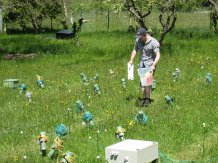Articles

Catching crickets for tagging. Credit wildcrickets.org
Wild insects ‘get old’ before they die
Short-lived wild insects “get old” – losing some of their physical abilities – before they die, new research shows.
Few studies have examined whether insects such as field crickets – whose adult life lasts a few weeks – experience “ageing” in the sense of physical decline in nature.
Insects are used to study ageing in laboratories, but it wasn’t clear whether they only reach “old age” because they are protected from a harsh natural environment.
“Just like humans, crickets get old,” said lead author Dr Rolando Rodríguez-Muñoz, of the Centre for Ecology and Conservation on the University of Exeter’s Penryn Campus in Cornwall.
“Though we didn’t find evidence of ‘live fast, die young’ in this species, those that put more energy into reproduction early in life showed some signs of faster decline as they aged.”
University of Exeter researchers used a network of more than 130 video cameras to study every hour of the lives of a population of wild crickets in a Spanish meadow.
They monitored reproductive effort, ageing and survival over a ten-year period.
They found no evidence of a “trade-off” between reproductive effort in early life (measured by emergence date, calling, searching and winning fights) and survival.
But the crickets that invested more in reproduction did show signs of “ageing” – chirping less and losing more fights.
“There’s a big question in biology about why we fall apart as we get old,” said Professor Tom Tregenza, also of the University of Exeter.
“In the past, it was thought that there was something inevitable about declining with age.
“But there has been a shift towards believing this is something we have evolved to do.
“Ageing may not be about inevitable decline, but about passing our genes on. In other words, we age because – instead of using our energy to maintain ourselves – we put it into reproduction.
“Selection might favour reproduction – passing on lots of copies of your genes – over simply surviving.”
The research was funded by the Natural Environment Research Council.
The paper, published in the journal Evolution, is entitled: “Testing the effect of early life reproductive effort on age-related decline in a wild insect.”
Date: 14 January 2019
